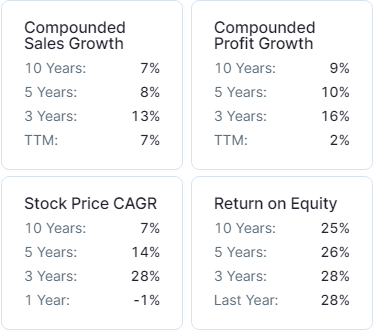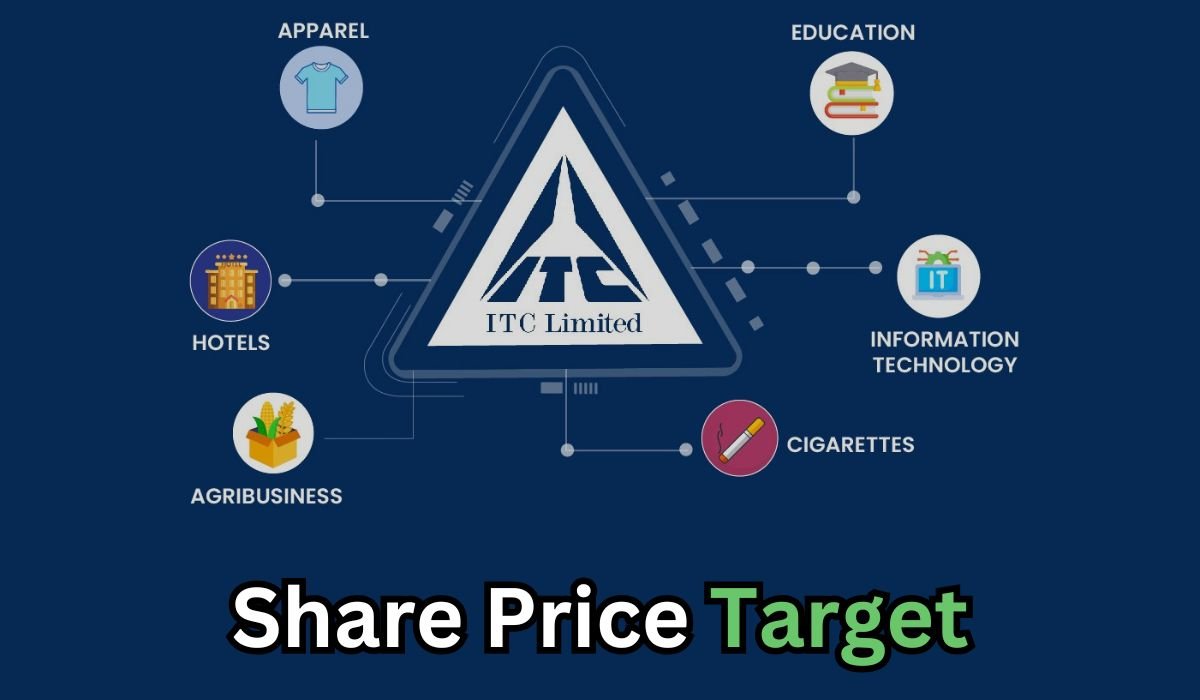India Tobacco Company Limited was listed on the Bombay Stock Exchange (BSE) in 1994. In the last five years, ITC Ltd. stock gave a massive return of more than 150% to its investors. Will it continue to provide such impressive returns this year and in the future? Let’s explore the ITC growth potential and ITC share price target 2025 to 2050 in this article.
About ITC

India Tobacco Company Limited (ITC) was founded in 1910. It is a multifaceted company with major businesses in FMCG, hotels, paperboards, packaging, and agriculture. ITC was originally centred on tobacco products, but it has now expanded into personal care, packaged foods, and lifestyle retail. ITC is a global leader in innovation and value development, with a reputation for sustainability initiatives.
ITC Business Model
- FMCG Sales: ITC sells a diverse range of fast-moving consumer goods, including as packaged meals, personal care products, stationery, and lifestyle retail. Aashirvaad, Sunfeast, and Fiama are among the company’s most profitable brands.
- Tobacco Products: ITC is a major player in the Indian tobacco market, producing and selling cigarettes under prominent brand names such as Gold Flake and Classic.
- Hotels and Hospitality: The company operates luxury hotels under the ITC Hotels brand, earning revenue from premium hospitality services and serving both domestic and international markets.
- Paperboards and Packaging: ITC manufactures environmentally friendly paperboards, speciality papers, and packaging solutions for industries such as FMCG, pharmaceuticals, and food.
- Agri-Business: ITC sources and exports agricultural products such as wheat, spices, and coffee. The company initiative connects rural farmers directly to markets, hence improving supply chain efficiency.
- Sustainability & Renewable Energy: ITC prioritises green activities, such as renewable energy production and sustainable forestry, to assist company operations and align with environmental objectives.
- Exports: ITC derives revenue from international markets by exporting FMCG products, tobacco, and agricultural commodities.
- Innovative Platforms: ITC uses digital platforms for direct-to-consumer channels to provide personalised solutions and grow its customer base.
ITC Fundamental Analysis
| Stock Name | ITC Ltd. |
|---|---|
| NSE Symbol | ITC |
| Market Cap | ₹ 5,46,932 Crores |
| 52W High | ₹ 495 |
| 52W Low | ₹ 378 |
| Stock P/E (TTM) | 26.8 |
| Book Value | ₹60.2 |
| Dividend Yield | 3.23 % |
| ROCE | 37.5 % |
| ROE | 28.4 % |
| Face Value | ₹ 1.00 |
| Industry PE | 32.6 |
| Price to book value | 7.08 |
| Debt to equity | 0.00 |
| PEG Ratio | 2.67 |
| Quick ratio | 1.86 |

| Share holders | March 2023 | March 2024 | March 2025 |
|---|---|---|---|
| FIIs | 43.35% | 40.95% | 39.87% |
| DIIs | 42.08% | 43.76% | 45.19% |
| Government | 0.04% | 0.04% | 0.04% |
| Public | 14.52% | 15.23% | 14.90% |
| No. of Shareholders | 29,30,527 | 36,48,537 | 36,47,886 |
Pros of Investing in ITC
- Leadership in FMCG and Tobacco: ITC dominates India’s cigarette business and has significantly grown its FMCG portfolio with brands such as Aashirvaad, Sunfeast, and Fiama, garnering considerable market share across many categories.
- High Dividend Production: ITC is known for rewarding shareholders with stable and major dividend payouts, making it a good choice for income investors.
- Strong Diversified Portfolio: ITC operates in a wide range of businesses, including FMCG, tobacco, hotels, paperboards, and agro, reducing reliance on any one area and maintaining income sources.
- Sustainability Focus: ITC’s commitment to sustainability is evident in programs such as the corporate platform, which empowers farmers, as well as renewable energy and sustainable packaging solutions, both of which contribute to the company’s ESG profile.
- Increase in DIIs Holding: Domestic Institutional Investors (DIIs) have increased their holding to 45.19% in March 2025 from 44.91% in December 2024, which indicates growing confidence in the ITC future potential by the DIIs.
Cons of Investing in ITC
- Tobacco Regulatory Risks: The tobacco business accounts for a substantial percentage of ITC’s revenue, and it is subject to tight regulations and high taxes, which may have an impact on growth and profitability.
- Dependence on Cigarettes: Despite diversification, cigarettes continue to account for a significant portion of ITC’s income, leaving the corporation exposed to decreasing smoking rates and anti-tobacco initiatives.
- FMCG Margin Pressure: ITC’s FMCG division competes in a highly competitive market with established firms such as Hindustan Unilever and Nestlé, resulting in margin pressure and the requirement for significant marketing investment.
- High Capital Expenditure: ITC’s development into hotels and other capital-intensive companies requires large investments, which may have an impact on short-term profitability and returns.
- Moderate Growth in Non-Tobacco Segments: While ITC’s non-tobacco segments are expanding, they have yet to reach the profitability and size of the cigarette industry, resulting in an unequal revenue mix.
- Potential ESG Concerns: ITC’s reliance on the tobacco industry worries socially responsible investors, restricting its appeal to certain investor categories.
- Slow Global Presence Expansion: Compared to its competitors, ITC has a small international presence, which may hinder its potential to capitalise on global growth prospects in FMCG and other industries.
- Decrease in FIIs Holding: Foreign Institutional Investors (FIIs) have reduced their holding to 39.87% in March 2025 from 40.17% in December 2024, indicating a decline in FII’s confidence in the company’s future growth prospects.
ITC Ltd Balance Sheet
| Particulars | March 2023 | March 2024 | Sept 2024 |
|---|---|---|---|
| Equity Capital | 790 | 1,248 | 1,251 |
| Reserves | 22,368 | 73,259 | 74,015 |
| Borrowings | 102 | 303 | 304 |
| Other Liabilities | 12,069 | 16,944 | 18,501 |
| Total Liabilities | 35,329 | 91,754 | 94,071 |
| Fixed Assets | 12,140 | 27,820 | 29,492 |
| CWIP | 2,062 | 2,861 | 1,387 |
| Investments | 5,981 | 31,114 | 28,409 |
| Other Assets | 15,146 | 29,959 | 34,784 |
| Total Assets | 35,329 | 91,754 | 94,071 |
By the end of 2025, the ITC share price is expected to be around ₹480 in normal conditions. In a bear market, it might be ₹428, and in a bull market, it may go up to ₹740.
| ITC Share Price Target 2025 | Rupees (₹) |
|---|---|
| 1st Target | 428 |
| 2nd Target | 480 |
| 3rd Target | 740 |
In 2026, the ITC share price is expected to be around ₹700 in a normal situation. In a bear market, it might be ₹650, and in a bull market, it may cross ₹950.
| ITC Share Price Target 2026 | Rupees (₹) |
|---|---|
| 1st Target | 650 |
| 2nd Target | 700 |
| 3rd Target | 950 |
According to our analysis, the ITC share price is expected to be around ₹1050 in 2027. In a bear market, it might be ₹1000, and in a bull market, it may cross ₹1260.
| ITC Share Price Target 2027 | Rupees (₹) |
|---|---|
| 1st Target | 1000 |
| 2nd Target | 1050 |
| 3rd Target | 1260 |
According to our analysis, the ITC share price may trade near ₹1400 by 2028; bearish conditions could pull it down to ₹1300, while a strong bull run might lift it to ₹1650.
| ITC Share Price Target 2028 | Rupees (₹) |
|---|---|
| 1st Target | 1300 |
| 2nd Target | 1400 |
| 3rd Target | 1650 |
In a normal situation, the ITC share price is projected to be approximately ₹1750 in 2029. In a bear market, the value may be as low as ₹1700, while in a bull market, it may rise to ₹2000.
| ITC Share Price Target 2029 | Rupees (₹) |
|---|---|
| 1st Target | 1700 |
| 2nd Target | 1750 |
| 3rd Target | 2000 |
By 2030, the ITC share price is projected to be around ₹2350 under normal conditions. In adverse markets, the price could fall to ₹2200, while favorable conditions might push it up to ₹2700.
| ITC Share Price Target 2030 | Rupees (₹) |
|---|---|
| 1st Target | 2200 |
| 2nd Target | 2350 |
| 3rd Target | 2700 |
By 2035, the ITC share price is projected to be around ₹3600 under normal conditions. In adverse markets, the price could fall to ₹3500, while favorable conditions might push it up to ₹4000.
| ITC Share Price Target 2035 | Rupees (₹) |
|---|---|
| 1st Target | 3500 |
| 2nd Target | 3600 |
| 3rd Target | 4000 |
Under normal conditions, the ITC share price might hit ₹5500 by 2040. A bearish trend could lower it to ₹5000, whereas a bullish surge could raise it to ₹6500.
| ITC Share Price Target 2040 | Rupees (₹) |
|---|---|
| 1st Target | 5000 |
| 2nd Target | 5500 |
| 3rd Target | 6500 |
In 2050, the ITC share price is expected to be around ₹12500 in a normal situation. In a bear market, it might be ₹12000, and in a bull market, it may go up to ₹14000.
| ITC Share Price Target 2050 | Rupees (₹) |
|---|---|
| 1st Target | 12000 |
| 2nd Target | 12500 |
| 3rd Target | 14000 |
| Years | Target Price |
|---|---|
| ITC Share Price Target 2025 | ₹428 to ₹740 |
| ITC Share Price Target 2026 | ₹650 to ₹950 |
| ITC Share Price Target 2027 | ₹1000 to ₹1260 |
| ITC Share Price Target 2028 | ₹1300 to ₹1650 |
| ITC Share Price Target 2029 | ₹1700 to ₹2000 |
| ITC Share Price Target 2030 | ₹2200 to ₹2700 |
| ITC Share Price Target 2035 | ₹3500 to ₹4000 |
| ITC Share Price Target 2040 | ₹5000 to ₹6500 |
| ITC Share Price Target 2050 | ₹12000 to ₹14000 |
Conclusion
ITC covers FMCG, hotels, paperboards, packaging, agriculture, and many more businesses. Its outstanding performance over the last five years, including an 82.45% return, demonstrates its durability and solid market position. As ITC continues to innovate and focus on sustainability, its development prospects remain bright, positioning it as a significant participant in India’s commercial scene. Whether the company can sustain this pattern, including the ITC share price target from 2025 to 2050, will be determined by its ability to react to changing market conditions and consumer tastes.
Disclaimer
This article is for educational purposes only. It is not a stock recommendation and should not be treated as such. Please ask your financial advisor before making any investment decision.
Also Read: Yes Bank Share Price Target 2025 to 2050

